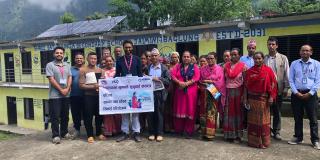
Kam Jaga is an international inclusive education volunteer advisor from the UK, who supports communities in rural Nepal in overcoming the socio-cultural and economic barriers that prevent children, particularly girls, from accessing education.
Read about his journey in Baglung and how volunteering with VSO made him a better teacher.
Meet Kam
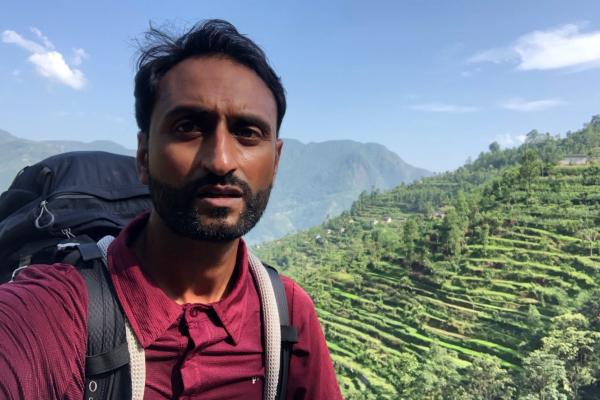
"I grew up in London, studied Geography at Cambridge University, and then started my career as a teacher. My parents, originally from northern India, immigrated to the UK in the 1960s.
After I finished university and saw all the different kinds of natural disasters and famines going on in the world, my interest in global development grew. It led me to volunteer in Nepal in 2008, which sparked my passion for charity and international development work.
I continued working in Asia and Latin America, including India and Peru. In 2018, I joined a VSO-and-UNICEF-run psychosocial support project in Ethiopia, supporting displaced children, families and teachers – I loved, it was the most rewarding time of my life.
Why did you want to do another volunteering placement with VSO?
After I came back home, I wanted to do another project with VSO, but COVID-19 hit so it would have to wait. In 2022, I had the opportunity to join VSO’s inclusive education project, SIKAI, in Nepal, funded by the Hempel Foundation.
Nepal is one of the poorest countries in Asia with a poverty level of 23% and an education system that often fails to provide children with a basic quality education. Despite marked improvements, student retention in schools remains a challenge, with almost 50% of students leaving the education system before secondary level.
I currently live and work in a small rural village in one of the project areas. The region is particularly challenging to reach due to its rugged terrain, making this work even more critical. The facilities in schools in this area are also often poor and teachers lack access to training. Many children do not attend school or drop out owing to discrimination caused by gender, disability or caste.
This project focuses on training teachers and communities in 60 remote schools in Baglung, aiming to provide marginalised girls and boys with access to basic education. Our goal is to enhance inclusive education, particularly focusing on getting girls back to school and improving the education system for marginalised communities by addressing social, cultural, and economic barriers.
What does a typical day on the project look like?
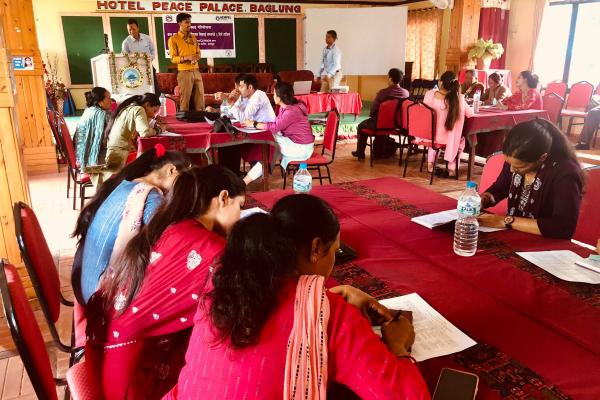
Between things like monsoons and a recent teachers' strike, there's no such thing as typical day. We hold a number of varied activities such as parental awareness sessions, school visits, teacher trainings and meetings with the local government.
In a typical month we spend 10 days in the field visiting remote schools and staying at local teacher's houses, conducting trainings such as child protection and parental awareness sessions on traditional harmful practices.
After returning we may have meetings with local officials in the municipality on future plans or events. Then we may have a week of creating reports and plans and then a three-day teacher training workshop, inviting one teacher from each of the 30 schools.
One of the challenges has been accommodation. During activities like the child protection training, we could be staying in very remote locations with limited amenities. I’ve learnt to come prepared with my own essentials like mosquito nets, bed sheets, battery packs, and torches.
PowerPoint is useless out here, but I've found that using visual aids is highly effective. We've printed key training materials on flexible, laminated paper, allowing us to engage the audience effectively and adapt to different environments.
Flexibility, mental preparedness, and creative problem-solving skills were vital to managing the unexpected.
What was your experience collaborating with national volunteers and peers?
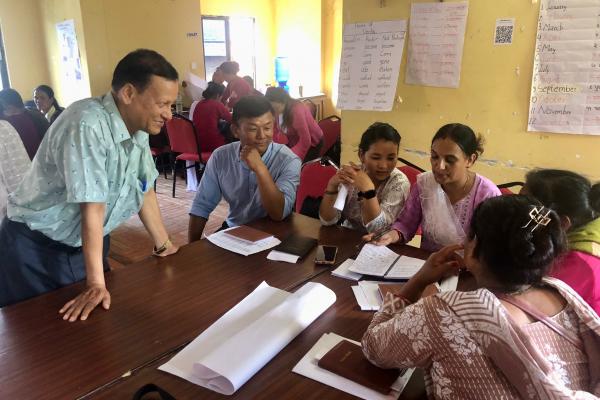
Communication is a massive component of success and working with national volunteers like Dev, who speaks excellent English and is invaluable in overcoming communication barriers as I don’t speak the local language. Dev has delivered training using materials I produced, so together as a team we work well through the blended approach to volunteering.
Working alongside both national and community volunteers to communicate ideas, conduct fieldwork, and deliver training as needed has been key to the project's success.
As an international volunteer, my role is to monitor work, as well as bringing in new perspectives, ideas, and ways of working.
My most rewarding moment as a volunteer so far has been the feedback for some of the training sessions I designed to be delivered in the schools.
The feedback from national volunteers, teachers, and our local partner agency confirmed that it was the most effective training they had experienced in the project's history. It was a moment that demonstrated how our teamwork had truly made an impact.
Sometimes we can have big ideas that we're going to change the world, and development is all black and white. But it’s more about planting the seed that can help change attitudes and mindsets.
It’s not particularly tangible and you can’t always quantify it, but you can see it through interactions with the communities. It's very hard to measure this statistically, but I think all those things are small steps that will create a big change in the long term.
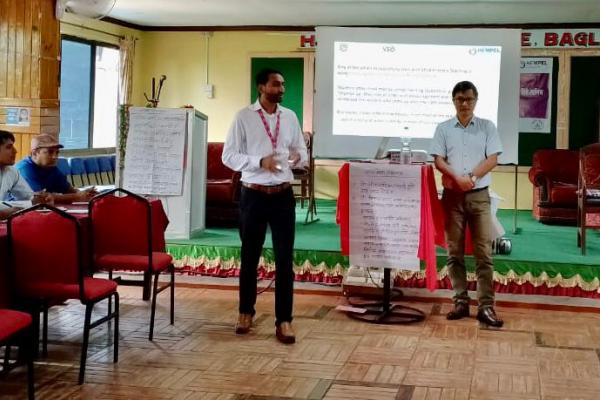
Volunteering is important because it helps bring about a positive culture of lasting change. As an international volunteer I felt the local government and local people were very much on side when I shared ideas. They felt a sense of trust that we are working together for the greater good, rather than just some organisation or person getting a huge salary for their role.
Volunteers are generally treated with high regards as the local communities respect someone who has expertise doing the role as a volunteer. However, it is important the volunteer engages with the locals in a positive manner to bring about lasting change.
Volunteering also benefits the individual volunteer, who can learn so much from embracing a different culture and ways of working along with gaining amazing life-changing experiences.
How did you grow personally and professionally, from your experiences?
Volunteering with VSO in Ethiopia and Nepal was the most important and valuable experience of my life! I personally learnt how to deal with setbacks, how difference cultures work and the differing mindset of people. It made me understand the world and view things in a whole new way, which I have taken on in my everyday life.
Professionally, I learnt immensely from working with local governments, partner NGO’s, teacher trainers and VSO staff. Only by working first-hand in these environments can you truly comprehend the learning professionally and take them into any new role.
There have been many ups and downs, which is normal and has helped me to build resilience, which is an amazing life skill.
How did you spend your free time, and what brought you joy outside of the project?
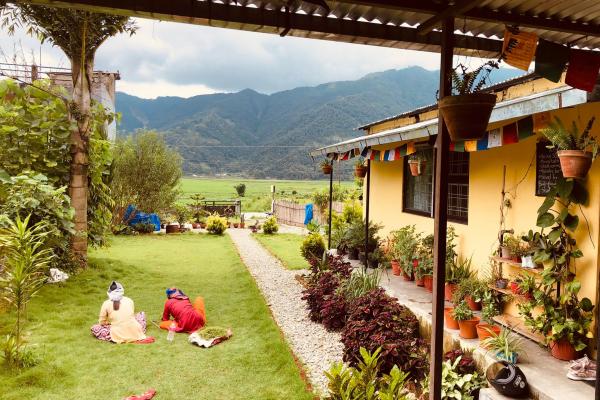
During my time in Kathmandu, the VSO office organised activities like Futsal (5-a-side football) on Tuesdays and Thursdays after work, which helped me settle in, make friends, and become part of the team.
I also participated in the international NGO Cup tournament and joined a running group called the 'Hash Harriers', where I made friends and got involved in various social events.
In the small village where I currently live, I still have a few friends that I go running with every day. I sometimes like to go to Pokhara Lakeside – it’s a long and complicated journey, but spending the weekend surrounded by beautiful mountainous scenery is a big reward.
If I have a few days off, there’s lots to do like singing bowl meditation, trying different foods, and listening to live music. All these things are great to make sure you’re balancing your work and your wellbeing properly.
Would you encourage someone to volunteer with VSO?
I would recommend trying volunteering for sure! I've had such a fabulous experience with VSO, and I would certainly recommend anyone with the right skills and mentality to do it.
However, make sure your expectations are realistic. While you can't change the world overnight, the experience can still be incredibly meaningful.
Understand that lasting change takes time, such as planting ideas and shifting mindsets within the community.
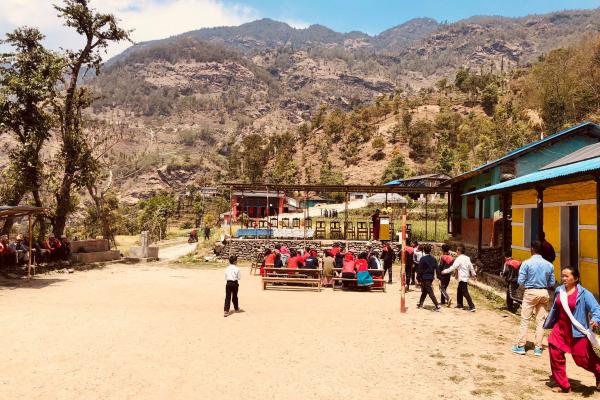
It's also important to research and manage expectations about the country you'll be in, visa or work permit processing times, and the living context. Being well prepared is crucial to ensuring you can be as effective as possible while you’re there.
Spending five months in Kathmandu waiting for a work permit was mentally challenging. It required resilience, patience, and a positive outlook.
Through volunteering, I’ve learned to adapt to working with diverse cultures and getting your ideas across despite all kinds of cultural, physical, and linguistic barriers.
Drawing from my experience in Ethiopia, I learnt the value of treating everyone well, from cleaners to managers, which creates a positive environment where everyone is happy to help.
This experience has taught me patience, cultural sensitivity, and continuous learning, enhancing my personal development, and building on my previous experiences. I am always trying to learn something new.
In the future, I’d love to see a lasting improvement in the education system, marked by a changed mindsets and attitudes within communities. I hope my approach to organisation, time management, and training methods can leave a positive impact.
I want communities to witness continued implementation of child protection policies and to see girls' education rates at 100%, as it should be! To see that in the future, that would be a great legacy to have.
What is next for you?
After the latest amazing experience on the SIKAI inclusive education project with VSO Nepal, I know my heart is in development and humanitarian work. I especially feel a deep connection when working with the most marginalised and vulnerable.
From my time on the UNICEF project with VSO Ethiopia, I knew this was my calling and this is my plan for the future. I have gained many skills and experiences which will help me in any path that I chose, even if I go back to teaching in the UK.
I feel I have certainly become a better teacher. Thus, it is a total win win and I feel privileged to have had this unbelievable opportunity."
How VSO are creating inclusive education spaces in Nepal

SIKAI — meaning 'learning' in Nepali' — is an inclusive education project that aims to address socio-cultural and political barriers faced by marginalised girls and boys in accessing basic education as well as supporting their transition from childhood to adolescence.
The project is funded by the Hempel Foundation and is implemented by VSO together with implementing partner BYC in Baglung. SIKAI, aims to improve learning outcomes for children and help them transition to high school education
Read more
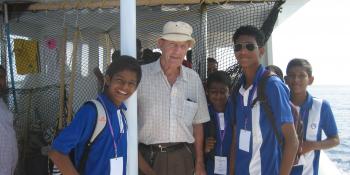
Transforming lives through education: Geoffrey’s VSO legacy
With a deep belief in the transformative power of education, Geoffrey from Norfolk, UK, has devoted his life both in the UK and abroad to making education more accessible for all.
